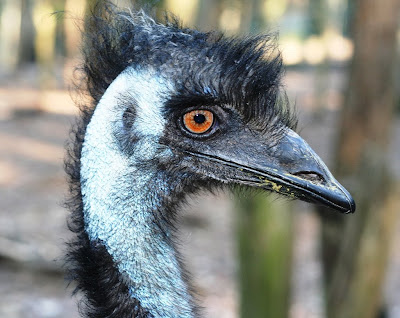
In junior high I was a member of an agricultural youth organization known as 4-H. I'm not exactly sure, but I think that the four H's of 4-H meant Head, Heart, Hands, and Huge Flightless Birds. You see, my 4-H club pioneered the area of 4-H emu husbandry. For two years, I learned how to raise emus from chicks- feed them, catch them, sex them, vaccinate them, show them, and sell them. (They may look like dinosaurs, but they taste like top sirloin.) I came to love their musical booming and drumming, their dark chestnut eyes, their black curls, blue skin, and smooth, brown bifurcated feathers. They were to me like lovely exotic parrots but taller and better at running.
The nation of Australia has had a love-hate relationship with their most common native Ratite. Emus proliferate all over Australia, and sometimes they trample and eat crops. In 1932 Western Australia declared war on emus, sending men with machine guns after them. The emus won. As Australian ornithologist D. L. Serventy recorded: "The machine-gunners' dreams of point blank fire into serried masses of Emus were soon dissipated. The Emu command had evidently ordered guerrilla tactics, and its unwieldy army soon split up into innumerable small units that made use of the military equipment uneconomic. A crestfallen field force therefore withdrew from the combat area after about a month." Despite the tendency of irritated farmers to occasionally shoot them, emus are now, for the most part, considered important members of Australian fauna. They are now protected by law and (unofficially) the national bird of Australia.

The thing I always rather liked about the emus was their innate curiosity. Standing still for a minute in the emu enclosure rewarded you with an entire flock (or is it herd?) of emus all eager to sample your hair, your clothes, and your shoelaces as they might chance to be edible. I guess when you are nearly six feet tall and armed with six vicious claws on the end of two powerful reptilian legs, you don't expect anyone to be foolish enough to cross you. Or perhaps they are just friendly. Cast down from the skies where their bird brethren soar, emus accept that they will always be forsaken oddities and must make friends where they can. Even if those friends include someone like a gawky teenage girl with a disturbing habit of wearing flannel.
Top photo by flickr user OZinOH licensed under Creative Commons Attribution-NonCommercial 2.0 Generic license.
Wonderful! I love this emu! What a beautiful post about forsaken oddities that, by nature of that oddity, make great friends with anyone or anything!
ReplyDeleteWe still have your 4 H Superior Award trophy from the South Florida Fair 1997.
ReplyDelete